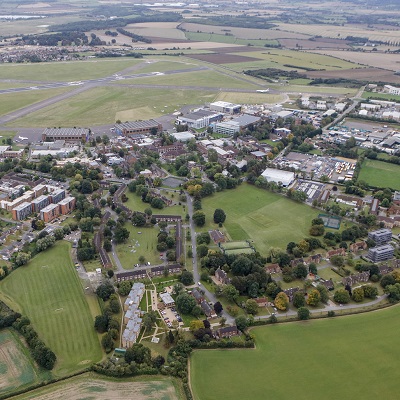Overview
- Start dateJanuary or May
- DurationTwo to three years - part-time MSc, two years PgDip or up to two years PgCert
- DeliveryTaught modules 61%, Individual research project 39%
- QualificationMSc, PgDip, PgCert
- Study typePart-time
- CampusOnline and Cranfield campus
Who is it for?
This course is suitable for people from a wide range of academic and professional backgrounds. We have welcomed students from the aviation, maritime, road and rail transport industries, as well as from manufacturing sectors and military. Our students are typically interested in developing their careers within investigation and normally are very motivated to learn in this field. As a student, you will work towards a qualification that will allow you to further your career development in accident investigation or other safety related areas of the transport industry.
Discover the unique facilities available to you as a student on this course.
Why this course?
The MSc in Safety and Accident Investigation allows you to receive an internationally recognised qualification in the field of accident investigation, from an highly-regarded and well known institution. Cranfield's Safety and Accident Investigation Centre has been a centre of excellence for aircraft accident investigation for over 40 years. In 2011, we were awarded a Queen’s Anniversary Prize for our world-leading work in aviation safety through research and training in air accident investigation.
We started our multi-modal accident investigation training in 2005, and have since then established our rail and marine accident investigation training capabilities. Our industry connections and notability mean that we increasingly receive interest from other safety critical industries such as healthcare, infrastructure and power generation, which allows us to further expand our teaching and offer increasing employability opportunities to our graduates.
An important aspect of this course is the use of hands-on workshops and simulations to develop the practical skills required as an investigator, including interviewing techniques, analysis techniques, and technical writing. This is complemented by sessions that enable you to conduct rigorous research and scientific analysis. Throughout the programme you are supported and taught by Cranfield teaching staff and also by leading industry practitioners.
The course is specifically designed to meet the learning aspirations of the international safety professional community. The highly practical nature of the course requires course attendance in the UK for some elements of the programme. However, most of the research and module assessments can be completed online. Cranfield University offers a comprehensive range of library and IT services tuned to support distance learning, enabling domestic and international students to study while balancing work/life commitments.
Informed by Industry
The Industry Advisory Board for this course consist of representatives from several government and commercial organisations who have an interest in safety and accident investigation. This includes representatives from government investigation agencies, military investigation departments, manufacturers and airlines. The board meets annually to ensure the course maintains its very high standard and the course content remains relevant and up-to-date.
Board members have, or have included, representatives from:
- International current and former state investigators.
- International current and former military investigators.
- Safety and investigative consultants.
- Leading academics in variety of fields involved in safety and investigation.
- State regulators.
- Safety and investigation industry professionals.
Course details

Set A (choose one)
Applied Aircraft Accident Investigation.
Applied Marine Accident Investigation.
Applied Rail Accident Investigation.
Applied Road Accident Investigation.
Set B (take all three)
Interviewing Techniques for Accident Investigators*.
Investigating Human Performance*.
Analysis Techniques for Accident Investigators*.
Set C (10 credits each unless specified)
Applied Aircraft Accident Investigation (30 credits).
Applied Marine Accident Investigation (30 credits).
Applied Rail Accident Investigation (30 credits).
Applied Road Accident Investigation (30 credits).
Interviewing Techniques for Accident Investigators*.
Investigating Human Performance*.
Analysis Techniques for Accident Investigators*.
Crisis Management and Business Continuity*.
Human Factors in Aviation Maintenance.
Flight Data Monitoring.
Aviation Safety Management.
Safety Assessment of Aircraft Systems.
Introduction to Aircraft Structural Crashworthiness§.
* non-transport specific
§ module from different School
Course delivery
Taught modules 61%, Individual research project 39%
Individual project
The last part in your MSc journey is completing the individual research project, where each student will be supervised individually by a member of an academic staff.
The individual research project is a chance to study a specific subject or problem area in much greater depth and use some of the techniques learned during the course. It gives MSc students an opportunity to apply the technical and analytical skills taught during the course, in a practical way. The subject areas chosen for research projects will be ones which require the student to review literature, collect data, carry out scientific analysis and contribute to either body of knowledge or practical application. The output of this project is a written report presented in the format of a journal paper.
Modules
Keeping our courses up-to-date and current requires constant innovation and change. The modules we offer reflect the needs of business and industry and the research interests of our staff and, as a result, may change or be withdrawn due to research developments, legislation changes or for a variety of other reasons. Changes may also be designed to improve the student learning experience or to respond to feedback from students, external examiners, accreditation bodies and industrial advisory panels.
To give you a taster, we have listed the compulsory and elective (where applicable) modules which are currently affiliated with this course. All modules are indicative only, and may be subject to change for your year of entry.
Course modules
Compulsory modules
All the modules in the following list need to be taken as part of this course.
Fundamentals of Accident Investigation
| Aim |
To provide accident investigators with the fundamental knowledge and skills to conduct a general transport accident investigation. |
|---|---|
| Syllabus |
a) Accident response and management 1. Accident response • Investigation case studies exercise and debrief• Roles and responsibilities of different interested parties • Accident notification processes • Deployment considerations • Investigation site management and procedures • Health and safety at the accident site • Initial appraisal of land- and sea-based sites 2. Investigation management • The purpose of safety investigations• Regulatory requirements • Group system of investigation • Managing high-profile, complex and large investigations • Accident pathology • Working with the media • Liaising with victims and families • Court procedures for investigators b) Conduct of an investigation 1. Evidence collection • Defining evidence• Evidence within the investigation process • Types of evidence • Principles of identifying and recording of evidence • Evidence harvesting and preservation • Wreckage and evidence photography • Site survey techniques, including remote site surveys and underwater surveys • Investigative interviewing techniques • Working with data recorders and other sources of electronic data, including different types of memory • Understanding crashworthiness and survivability issues 2. Human factors in accidents • Human factors aspects in accident investigation• Passenger behaviour 3. Analysis of evidence • Fundamentals of analysis• Analytical approaches • Organisational accidents • Applying analysis tools • Application of analysis methods in investigation simulation 4. Developing safety recommendations • Relations with the regulator and other parties• Developing and managing recommendations • Follow-up actions 5. Report writing • Purpose of an investigation report• Planning and preparation of a report • Report structure and format c) Practical workshops • Evidence collection workshop• Site tutorial workshop (field) • Accident simulation exercise (field) • Courtroom procedures workshop |
| Intended learning outcomes |
On successful completion of this module you will be able to:
|
Research Methods (MSc only)
| Aim |
Industrial roles which draw on skill sets in safety and human factors demand the skill sets developed in this module in support of the course level learning outcomes. |
|---|---|
| Syllabus |
|
| Intended learning outcomes |
On successful completion of this module you should be able to:
|
Elective modules
Four of the modules from the following list need to be taken as part of this course.
Analysis Techniques for Accident Investigators
| Aim |
|
|---|---|
| Syllabus |
Pre-read (online learning via VLE): Contact time: |
| Intended learning outcomes |
On successful completion of this module you will be able to:
|
Applied Aircraft Accident Investigation
| Aim |
This module builds on the Fundamentals of Accident Investigation module to develop specialist skills for the investigation of aircraft accidents. |
|---|---|
| Syllabus |
• Impact and flight path assessment. • The operations investigator’s approach. • The engineering investigator’s approach. • Sources of physical, data, documentary and people evidence. • Conduct of complex/major investigations. • Aircraft structural failure (metal/composites). • Aircraft performance. • Crew and maintenance performance and human factors aspects. • Flight data recorders. • Cockpit voice recorders. • Use of recorded data. • Survivability factors. • Investigation approach - case studies. Air traffic control • ATC investigations and case studies. State investigation bodies • Overview of a civil air accident investigation organisation. • Piston engine operations. • Turbine engine operations. • Role of manufacturer in investigation. • Engine teardown on site/at base. • Birdstrikes/FOD. • Case studies. Major investigation simulation • Hazard identification at an aircraft accident site. • Management of risk at an aircraft accident site. • Physical examination of wreckage. • Accident site photography. • Accident site management. • Wreckage plotting. • Witness interviewing. • Application of analysis techniques. • Preparation of recommendations. • Formal report writing. • Debriefing. Investigation management • Dealing with other agencies. • Accredited representatives/technical advisors. • Participating in an overseas investigation. • Managing an investigation. • Managing the politics. • Managing the news media. • Preparing to release an investigation report. • The role of the Investigator in Charge. • The role of the Chief Inspector. |
| Intended learning outcomes |
On successful completion of this module you will be able to:
|
Applied Marine Accident Investigation
| Module Leader |
|
|---|---|
| Aim |
This module builds on the Fundamentals of Accident Investigation module to develop specialist skills for the investigation of marine accidents. |
| Syllabus |
The international legal basis for marine accident investigation and the practical application of the rules, recommendations and guidance: • Historical background and the role of the IMO.• UNCLOS, SOLAS, MARPOL and other relevant conventions. • The Casualty Investigation Code. • National laws. • VDR ownership and recovery. • EU Directive. • Databases. Case studies as appropriate. Managing a marine accident investigation: • Notification of and coordination and communication with other agencies/parties.• Using technical advisors. • Time/resource management. • Managing the news media. • Cultural aspects. • Preparing to release an investigation report. • Managing recommendations. • Possible litigation aspects. • The role of the Investigator-in-Charge. • The role of the Chief Inspector. • Case studies and simulations, as appropriate. Marine specific investigation techniques Site risk assessment and hazard identification for common marine accident scenarios: • Access to the accident site.• The presence of dangerous substances and atmospheres. • Bio hazards in the marine environment. • The safety of the ship platform. Case studies e.g. CP Valour (Bermuda), MSC Napoli (UK). Evidence preservation and collection issues in common marine accident scenarios: • Access issues.• Commercial pressures. • Legal considerations. • Technical evidence- VDRs, AIS, ECDIS, VTS, CCTV. • Evidence collection strategies. • Various case studies, as appropriate. Human performance, human factors and marine accidents: • Risk and risk-taking behaviour. Investigating marine collisions, contacts and grounding accidents: • Displaying and analysing VDR and other electronic evidence, MADAS.• Collision regulations and their effectiveness. • Investigating competence, fatigue and other human performance issues. • Collisions in poor visibility, safe speed issues. • Casualties in harbour areas, master/pilot relationship. • Case studies e.g. Cosco Busan (US) Lykes Voyager/Washington Senator (UK), Royal Majesty (Panama). Investigating ship fires: • Site risk assessment and hazard identification.• Engine room fires. • Cargo fires. • Accommodation fires. • Fire detection, firefighting, fire protection and evacuation issues. • Case studies, as appropriate. Investigating structural/material failures, loading and stability problems: • Maintenance and operational history.• Practical evidence gathering problems and potential solutions. • Corrosion, fatigue and other failure modes. • Forensic analysis methods. • Case studies, as appropriate. Investigating machinery failures: • Overview of different types of engineering and machinery failures.• Sources of evidence. • Non-destructive & destructive testing. • Trials and reconstructions. • Failure mode analysis. • Case studies, as appropriate. Investigating occupational health and safety accidents: • Analysis of common marine occupational accidents, eg.• Enclosed space entry accidents. • Accidents involving use/misuse of machinery – watertight doors, cranes. • Mooring accidents. • Lifeboat, rescue craft and evacuation equipment accidents. • Safety Management issues. • Case studies as appropriate. General investigation techniques Enhanced investigative interviewing techniques: • General recap of investigative interviewing and memory theory.• Overview of cognitive interviewing. • Introduction to SE3R methodology. • Quadrant Behaviour. Investigation analysis techniques: • General recap of analysis methods.• Principals and pitfalls of no-blame marine investigations. • Application of systemic models in marine investigations. • Overview of selected accident analysis models, eg. SHELL, AIBN model, STEP. • Case studies and mentored practical workshops. Investigation report writing and recommendation development: • Purpose of writing an investigation report.• Guidance on report writing. • Report planning and preparation. • Report structure. • Principles of writing an effective report. • Critiquing accident investigation reports. • Principles of developing effective recommendations. Major investigation simulation A major marine accident investigation exercise which examines: • Team and investigation management.• Team working. • Cooperation and coordination with other interested parties (including other investigations, the media etc.). • Securing the accident site. • Health and safety and risk assessment at the accident site. • Physical examination and accident site photography. • Physical and documentary evidence collection. • Technical evidence identification and collection. • Witness interviewing. • Evidence analysis. • Preparation of recommendations. • Formal report writing. • Debriefing. |
| Intended learning outcomes |
On successful completion of this module you will be able to:
|
Applied Rail Accident Investigation
| Aim |
This module builds on the Fundamentals of Accident Investigation module to develop specialist skills for the investigation of rail accidents. |
|---|---|
| Syllabus |
• Rail accident site management and dealing with other agencies. • Rail accident site risk management. • Advanced interviewing skills. • Advanced investigative photography. • Advanced analysis methods. • Investigating Safety Management System.
Investigating Railway Operations Accidents. • Investigation approach and overview of factors contributing to level crossing accidents, Signal Passed at Danger, over speeding, track worker/maintenance staff fatalities and near-misses, platform safety including platform-train interface and train door irregularities, train/vehicle runaways and authorised movements, and train/rail vehicle collision. • Relevant safety systems in train control. • Relevant human factors aspects. • Rail crashworthiness and passenger survivability. • Investigations related to light rail (tram) and driverless operations.
Investigating derailment accidents • Overview of factors contributing to derailment accidents and case studies. • Collecting, inspecting and interpreting evidence (on site). • Dynamic modelling of wheel/rail interface response. • Relevant human factors aspects. • Rail crashworthiness and passenger survivability.
Accident investigation simulation A five-day practical exercise in a simulated accident investigation scenario where delegates can apply the skills and knowledge acquired in the Fundamentals of Accident Investigation course and other workshops in the Applied Rail Accident Investigation series. The simulation takes the delegate through the entire investigation process from notification, site investigation, interviews, analysis, report writing and formulating recommendations. • Team and investigation management. • Securing the accident site. • Managing news media. • Health and safety at the accident site. • Risk assessment of the accident site. • Physical examination of wreckage/track. • Documentation investigation (procedures, manuals, logs, etc). • Accident site photography. • Accident site management. • Witness interviewing. • Application of analysis techniques. • Developing recommendations. • Formal report writing. |
| Intended learning outcomes |
On successful completion of this module you will be able to:
|
Applied Road Accident Investigation
| Aim |
This module builds on the Fundamentals of Accident Investigation to develop specialist skills for the investigation of road based accidents and safety investigations. |
|---|---|
| Syllabus |
• Collision scene examination. • The road investigator’s approach. • Sources of physical, data, documentary and people evidence. • Conduct of complex/major investigations. • Vehicle structural failure. • Vehicle performance. • Driver performance and human factors aspects. • Digital Data in Vehicles and associated data recorders. • Survivability factors. • Investigation approach - case studies. State Investigation Bodies:• Overview of a civil road accident investigation organisation. • Overview of a military land accident investigation organisation. Powerplants & Mechanical:• Vehicle propulsion systems - ICE / Electric / Hybrid. • Role of manufacturer in investigation. • Mechanical examination of vehicle on site/at base. • Case studies. Major Investigation simulation:• Hazard identification at a road accident site. • Management of risk at a road accident site. • Physical examination of site and wreckage. • Accident site photography. • Accident site management. • Wreckage plotting. • Witness interviewing. • Application of analysis techniques. • Preparation of recommendations. • Formal report writing. • Debriefing. Investigation management:• Dealing with other agencies. • Accredited technical advisors. • Participating in other investigations. • Managing an investigation. • Managing the interaction between agencies and competing priorities. • Managing the news media. • Preparing to release an investigation report. • The role of the Investigator in Charge. • The role of the Chief Inspector of Road Safety. |
| Intended learning outcomes |
On successful completion of this module you will be able to:
|
Aviation Safety Management
| Aim |
|
|---|---|
| Syllabus |
|
| Intended learning outcomes |
On successful completion of this module you will be able to:
|
Crisis Management and Business Continuity
| Aim |
Crisis management is a topic area relevant to airlines, airports and other organisations involved with delivering air transport. These organisations typically have dedicated personnel and departments to emergency response and crisis planning. The aim of this module is to provide you with an overview of how to plan for crises, what to expect when they happen, and how to deal with practicalities such as dealing with media, survivors and in the longer term, insurers. |
|---|---|
| Syllabus |
|
| Intended learning outcomes |
On successful completion of this module you will be able to:
|
Flight Data Monitoring
| Aim |
To provide an understanding of Flight Data Monitoring within a commercial organisation and to detail the uses, processes and responsibilities of a successful FDM programme. |
|---|---|
| Syllabus |
|
| Intended learning outcomes |
On successful completion of this module you should be able to:
|
Human Factors in Aviation Maintenance
| Aim |
The module aims to provide a broad overview of the nature and management of human error in the aviation maintenance domain. Key theories and frameworks for investigating maintenance human error, contributing factors and effects on operations are introduced. The challenges associated with practical application of currently available safety tools are examined together with the latest strategies to enhance understanding and management of maintenance error. This module does not require previous background in aviation maintenance and engineering. |
|---|---|
| Syllabus |
|
| Intended learning outcomes |
On successful completion of this module you should be able to:
|
Interviewing Techniques for Accident Investigators
| Aim |
View the details for this module The Interviewing for Accident Investigators module is designed to provide delegates with an enhanced level of theoretical and practical skills to effectively interview various types of witness to gather evidence in support of successful safety accident investigations. |
|---|---|
| Syllabus |
1. Refresher of the fundamentals of investigative interviewing: Use of different questioning techniques – Open v. Closed, Directed, Confirmatory, etc.
2. Enhanced theory of investigative interviewing
3. Preparation for the interview
4. Conducting the interview
5. Post-interview phase |
| Intended learning outcomes |
On successful completion of this module you will be able to:
|
Investigating Human Performance
| Aim |
The Investigating Human Performance module encourages students to look critically at the contribution humans make in high reliability organisations (HROs). Using psychological theory and analysis, the human contribution (positive and sometimes negative) is addressed. Theories and approaches of human performance explored on this module should help the student understand the human factors affecting those involved with accidents or incidents, as well as the investigator. |
|---|---|
| Syllabus |
Introduction to human factors: Individual factors: • Human cognition • Medical factors • Workload, fatigue and tiredness
- Tiredness versus fatigue |
| Intended learning outcomes |
On successful completion of this module you will be able to:
|
Introduction to Aircraft Structural Crashworthiness
| Aim |
|
|---|---|
| Syllabus |
- Objectives and Approach.
- Regulations. - Human Tolerance. • Crash Energy Management.
• Structural Collapse. - Collapse of metallic and composite structural components. - Component collapse vs. structural collapse. • Introduction to methods for crash analysis. - Hand calculations. - Hybrid analysis methods. - Detailed analysis methods. • Role and capability of testing and simulation in the crashworthiness field.
|
| Intended learning outcomes |
On successful completion of this module you should be able to:
|
Safety Assessment of Aircraft Systems
| Aim |
To familiarise you with the various approaches to the problems of assessing the safety of increasingly complex aircraft systems. |
|---|---|
| Syllabus |
Outline of relevant accidents and system design philosophy. Discussion of acceptable accident rates and recent advances in systems. Introduction to probability methods. Regulatory background The development of requirements for safety assessment, FAR / EASA CS25—1309. Methods and techniques Introduction to the more common safety analysis techniques. Influence of human factors. Common mode failures, traps and pitfalls of using safety assessment and examples of mechanical systems and power plants. Use of safety assessment techniques Determination of correct architecture of safety critical systems. Fault Tree Analysis, Dependence Diagrams and Boolean algebra for quantification of system reliability. Zonal safety analysis (ZSA), Particular Risk Analysis (PRA) and Failure Mode and Effect Analysis (FMEA) of aircraft systems. Practical examples of the application of safety assessment techniques Minimum Equipment Lists (MEL), Safety and Certification of digital systems and safety critical software. Application of Aerospace Recommended Practice (ARP) 4761. Typical safety assessment for a stall warning and identification system. Current and future issues Integrated and modular systems and their certification. Certification maintenance requirements. Flight-deck ergonomics. |
| Intended learning outcomes |
On successful completion of this module you should be able to:
|
Teaching team
The course director for this programme is Mr Craig Cattell.
Your career
The majority of students join this course with the intention of receiving a qualification that will support their career development in accident investigation or other safety related areas. Previous students have been employed by dedicated government investigation agencies, airframe and power plant manufacturers, air traffic services, safety regulation, insurers, and the military. The MSc in Safety and Accident Investigation allows you to receive an internationally recognised qualification in the field of accident investigation.
Roles our students have gone into include:
| State Ops Inspectors (Air/Rail/Marine) |
| State Engineering Inspectors r (Air/Rail/Marine) |
| State Data Recorder Inspectors (Air/Rail/Marine) |
| Healthcare Incident/Accident Investigators |
| Defence Safety investigators |
| State Transport Regulators |
| Company safety investigators |
| Safety investigators in other safety-critical industries such as Construction, Nuclear etc. |
Companies that employ our graduates include:
| UK AAIB |
| UK Defence AIB |
| Danish Armed Forces |
| Malaysia Armed Forces |
| UK MoD |
| CAA Malaysia |
| Air Canada |
| Swiss Air Force |
| UK NHS |
| Saolta University Health Care Group (Ireland) |
| Irish AAIU |
| Transport Accident Investigation Commission – New Zealand |
| Aviation Investigation Bureau (AIB) of Kingdom of Saudi Arabia |
| United Arab Emirates Air Accident Investigation Sector |
| Royal Air Force of Oman |
| Australian Defence Force |
| Norwegian Armed Forces |
| Hungarian TSB |
| Accident Investigation Bureau of Nigeria |
| Norwegian Safety Investigative Authority |
| Rolls-Royce Plc |
| Titan Airways |
| Etihad Airways |
| Korean Air |
| Costain (Construction) |
| Carnival Corporation |
| Thameslink Trains |
| London Underground |
| Volker Rail |
Cranfield’s Career Service is dedicated to helping you meet your career aspirations. You will have access to career coaching and advice, CV development, interview practice, access to hundreds of available jobs via our Symplicity platform and opportunities to meet recruiting employers at our careers fairs. Our strong reputation and links with potential employers provide you with outstanding opportunities to secure interesting jobs and develop successful careers. Support continues after graduation and as a Cranfield alumnus, you have free life-long access to a range of career resources to help you continue your education and enhance your career.
How to apply
This course offers two entry routes, direct entry to the MSc or associate student entry where you take modules for credit towards the MSc in the form of accredited short courses.
MSc entry
Click on the ‘Apply Now’ button to start your online application.
See our Application guide for information on our application process and entry requirements.
Associate student entry
For more information about studying accredited short courses as an associate student please contact shortcourse@cranfield.ac.uk.

A most enjoyable and thoroughly rewarding course which professionally develops the individual through both practical learning and exposure to industry experts. A diverse selection of courses are available that offer potentially new areas of professional study to explore. Worldwide experience and knowledge are shared from fellow international students, both in the classroom and socially, offering perfect networking links. This course is wholeheartedly recommended to anyone that wants to either further their career, or are exploring a new career avenue into Safety and Accident Investigation.
Captain Adam Williams, FDM Manager/Training Captain, Starspeed Ltd










